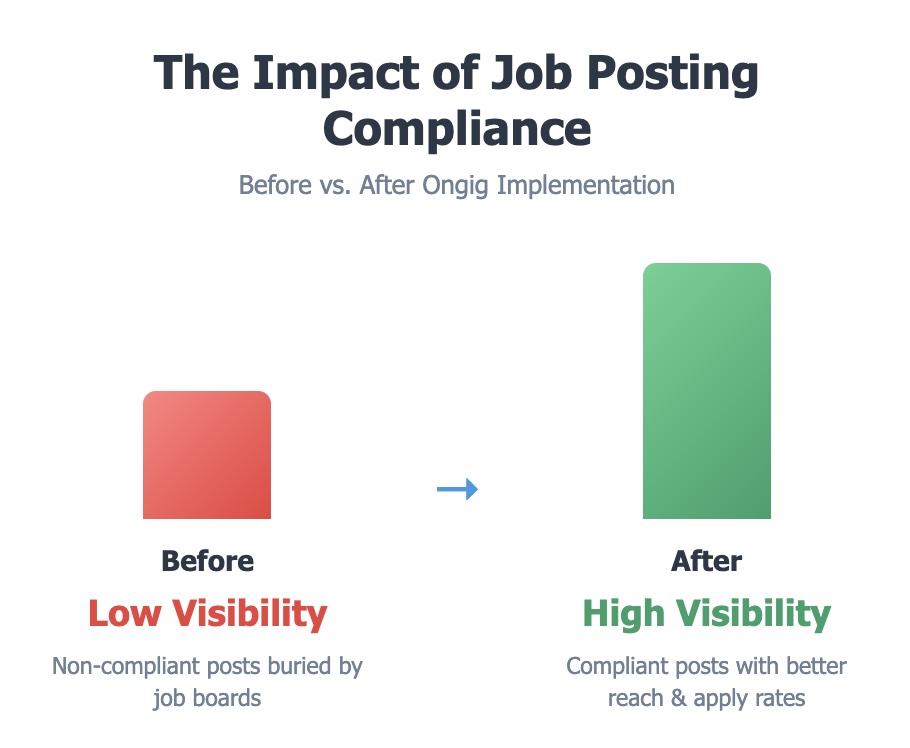- How to Write a Job Description — Best Practices & Examples (2026 Update) - February 26, 2026
- 10+ Examples of Top Companies with Autistic Hiring Programs (2026) - February 23, 2026
- What I’ve Learned About AI, Rigid SaaS, and Job Content Since Joining Ongig in 2019 - February 17, 2026
They thought their job postings were fine. But their listings were quietly getting buried, and they had no idea why.
This is what happens when job posting compliance slips through the cracks. It’s not just about legal exposure anymore. It’s about visibility, trust, and candidate experience.
The Hidden Risks of Non-Compliant Job Posts
One Ongig customer (a large national employer) came to us after noticing a drop in applicant traffic across multiple job boards. On the surface, their JDs looked “fine.” But after digging deeper, we uncovered problems that were costing them big:
- No salary ranges listed (in states that require them)
- Outdated EEO statements
- Subtle age bias (“recent grad preferred”)
- Poor accessibility for screen readers
The kicker? Job boards had started pulling their listings from search — without notifying them. Compliance wasn’t just a legal issue anymore. It had become a visibility crisis.
Why This Happens (and Why It’s Easy to Miss)
Most companies don’t have a centralized job description process. JDs are copy-pasted, edited in Word docs, or reused from outdated templates. That’s how non-compliant language slips through — and it stays live until someone flags it. Sometimes that someone is your legal team. Sometimes it’s the internet.
How Ongig Helped

When this employer partnered with Ongig, we started with a full compliance audit of their job description library. Using our JD software, we scanned every live posting for risks and red flags. What we found shocked them:
- Dozens of listings missing required pay ranges
- Inconsistent or vague OFCCP language
- Job ads unintentionally violating state regulations
We helped them rewrite and reformat every job post to meet compliance standards. Including:
- State-specific salary transparency laws (CA, CO, NY, WA…)
- Modern, inclusive EEO statements
- Bias-free phrasing and inclusive language
- Accessibility-friendly formatting and structure
The Results
After the overhaul, they saw:
- Better visibility on job boards (no more ghost listings)
- Higher apply rates from quality candidates
- Fewer legal review cycles and internal escalations
Job posting compliance became a strength, not a liability.
What You Can Learn From This
If you’re in TA, comp, or HR ops, job posting compliance might not be at the top of your to-do list. But ignoring it has real consequences. Here’s what we recommend:
1. Don’t Trust Old Templates
Just because a JD is sitting in your ATS doesn’t mean it’s compliant. Language gets outdated fast. Laws change. Your posts need regular checkups.
2. Automate the Review Process
Manual proofreading won’t cut it. You need software that flags risk before it goes live. Ongig’s platform does this in real time.
3. Treat Compliance as Visibility
It’s not just about checking boxes. Non-compliant posts get pulled from search, blocked by aggregators, or scare off candidates. That’s traffic you’ll never get back.
Why I Wrote This
At Ongig, we work with companies every day that didn’t realize their job postings were breaking the rules until it hurt their pipeline. Our job description software helps you write and rewrite postings that are not only compliant but also inclusive and effective.
If you want to make sure your job posts don’t get you in trouble (or buried), request a demo. We’ll show you exactly how to fix it — before it becomes a bigger problem.
FAQs
What is job posting compliance?
It means your job ads follow legal requirements (like salary transparency and anti-discrimination laws) and best practices for fairness and accessibility.
Which states require pay ranges in job postings?
As of now: California, Colorado, New York City, and Washington — with more joining. Including pay ranges is becoming the standard.
What happens if a job post isn’t compliant?
You risk being delisted by job boards, losing visibility, facing legal penalties, or damaging your brand with job seekers.
How does Ongig help with compliance?
Ongig’s software scans your job descriptions for compliance issues and helps rewrite them to meet legal and DEI standards — automatically.
Can Ongig integrate with my ATS?
Yes — we work with most major ATS platforms to streamline your job description workflow and make compliance seamless.
